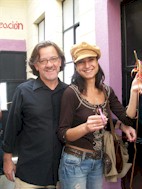|
  Big Mind Saves Lives: Big Mind Saves Lives:
On a
sunny Tuesday morning this May we arrived at one of the school projects
where we
work here in Guatemala.
As we were getting
settled, the psychologist of the
school told my wife Debora of something he had done the
previous day with the students. He handed her a
survey that he had given out to all of the
teenagers, with their answers on there. The
results of the survey was about their interest and
passion for living.
Here is the rest of story in the words of
Debora:
I remember
going survey by survey and thinking: I have to
talk with this student, and with this one, and
with this one, and so on. I finally realized that
I had to work with every single student, about 90
in all.
Anger was one of the most
dominant states, as well as a deep existential
fear. I realized that most of them
found life pointless, painful, sad, a waste, and
many had decided that a good way to end all
of their suffering was with suicide.
The
psychologist basically gave me the result and
said: I need help; what can you do with
this?
I
have to admit that I was a little overwhelmed by
the answers of the students, all I could say was:
let's help them reduce their immersion in these
states by doing some Big Mind with all of them!! The
psychologist's response was: Great, that is exactly what I was
looking for you to do!
So
grade by grade, I did a whole morning of Big Mind
with all the kids. There were three different
groups and I called many different voices. Of
course we did have some voices ready to call, but
as Genpo Roshi (founder of The Big Mind Process)
always told me: Never have an agenda and be
open to what comes up. So that is what I did.
After
some hard work of and calling voices such as: anger,
fear, the witness, self respect, self love, the
victim, the abuser, self-worth, life,
appreciation, precious human birth and so on,
something wonderful happened. Some kids cried;
some had awareness on their own faults; some
realized narcissistic and self centered behaviors,
and how those were projecting onto others,
therefore also realizing they were the victim and
the executor at the same time.
By using the Big Mind process to help the kids
bring mindfulness to these states of mind great
relief was realized.
Regret was another voice that came out. This voice
turned out to be very common in all of them. After
talking from and to that voice, they could see and
articulate by themselves how regretting and
repenting helps us change our motives for our
present actions. They also saw that there is no
point whatsoever in spending their lives thinking
about something that they ultimately cannot
change, as they cannot go back in time to change
the past, so they could now focus on the present
actions and reactions.
Some
of the most rebellious kids, previous gang leaders
and members, opened up and showed their pain,
emotions and vulnerability in front of the rest of
the class. They realized that their leadership can
also be used to do good and to empower other
students.
Mostly
they learned that they cannot demand to be loved
by others, but that they can begin to love and
respect themselves, and therefore to move on with
their lives without allowing others to control or
manipulate them. They realized that there is
no one to blame but oneself for not taking
responsibility for our lives.
The also learned that with just a little
mindfulness on their current states, ease of being
could arise in relationship to them, and that
those awful states might not bother them so much
anymore.
It
was interesting to see how all the groups were
able to come together beyond their differences as
one unique voice - to talk and to experience the
same wisdom together. They could take some
distance from themselves and see their own flaws
and also their own gifts and power. The kids also
learned to appreciate how precious they are in
their uniqueness and to respect the uniqueness of
others. In fact we all caught a glimpse of our
Oneness.
Thank you for reading.
Debora
Prieto
Mick Quinn
Integral Heart Foundation, Guatemala.
|